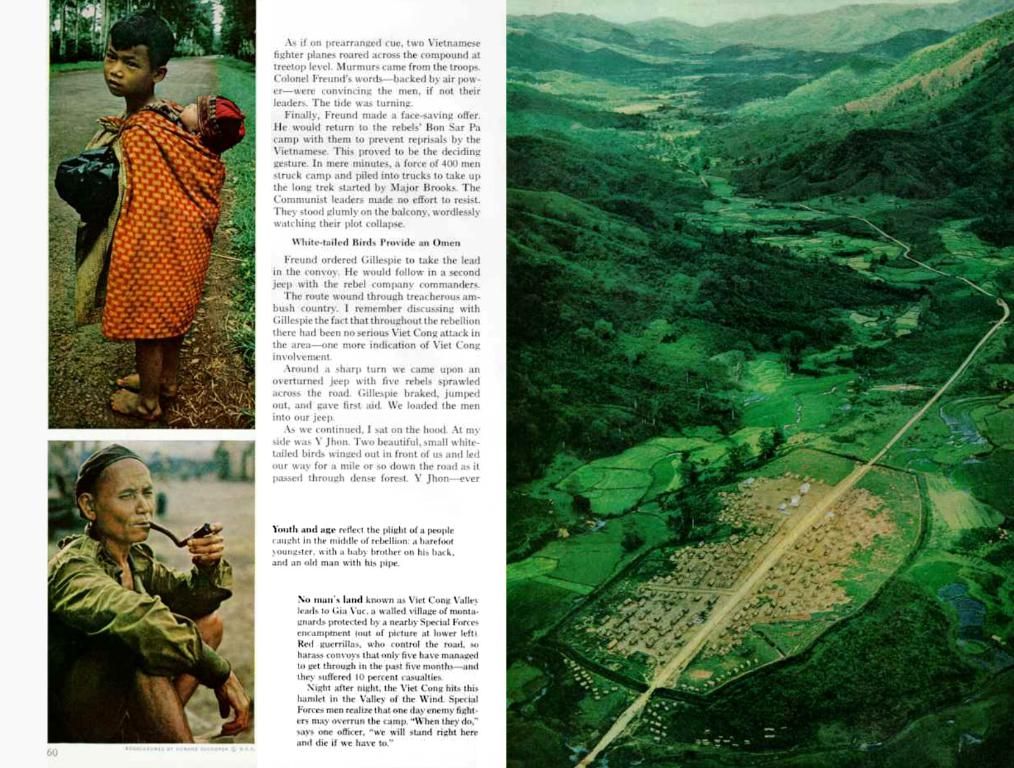Red Line Protest Echoes in the Netherlands and Belgium as the Israel-Palestine Conflict Continues
Significant attendance at a second Dutch demonstration calling for government intervention against Israeli actions
In a powerful show of solidarity, tens of thousands of Dutch and Belgian citizens marched through the streets last Sunday, donning red clothing and demonstrating against the Dutch government's policy towards Israel. The turnout for this event surpassed the May demonstration, signifying a growing public concern about the ongoing Israel-Palestine conflict.
The protesters in The Hague walked a symbolic 5-kilometer loop to create what they call the "red line" - a barrier that they believe the Dutch government should impose to halt Israel's campaign in Gaza. Marin Koning, one protester, asserted, "I don't want to be complicit in these horrendous crimes happening there, and I want to speak out."
Human rights groups like Amnesty International, Save the Children, and Doctors Without Borders and other aid agencies organized the march. The organizations estimated the peaceful crowd to be over 150,000, while local media placed the number closer to 100,000. In Brussels, around 75,000 people marched, with many also wearing red.
During the first Red Line protest in May, the crowds passed by the Peace Palace, the headquarters of the United Nations' International Court of Justice, where last year judges had ordered Israel to prevent death, destruction, and genocide in Gaza.
On the international front, the conflict continues to unfold, with Israel strongly denying any violation of international law in Gaza. The European Union's top diplomat has convened an emergency meeting of the 27-nation bloc's foreign ministers to discuss the conflict between Israel and Iran. The recent development comes weeks after the collapse of the country's ruling four-party coalition, leaving the Netherlands with a caretaker government as it prepares to host a summit of NATO leaders at the end of June.
Background Information:
- The Israel-Palestine conflict remains volatile, with ongoing military operations and political tensions exacerbating the situation.
- The U.S., Egypt, and Qatar mediated a ceasefire in January 2025, but it was short-lived, and Israel resumed its offensive in March.
- The U.S. has advised against travel to the region due to security concerns.
- The UN has criticized Israel's aid distribution system in Gaza for violating humanitarian principles.
- The situation remains fraught with diplomatic complications, as France has suggested recognition of a Palestinian state, an idea opposed by Israel.
Current Developments:
- The situation in Gaza is marked by ongoing violence, the potential for terrorist attacks, and severe humanitarian conditions, leading to reports of famine-like situations.
- The conflict has caused significant casualties, but recent numbers aren't detailed in the available information.
- The international community is increasingly involved, with the U.S., Egypt, and Qatar taking active roles in mediating ceasefires and diplomatic talks.
- As the global media continues to cover the Israel-Palestine conflict, news of the recent Red Line protests in the Netherlands and Belgium has spread, highlighting the growing public concern about the ongoing violence and humanitarian crisis.
- Amidst the turmoil, the Dutch government's health and law enforcement policies have come under scrutiny, with tens of thousands of citizens protesting against the government's stance towards Israel.
- In the midst of the conflict, the European Union's top diplomat has convened an emergency meeting, addressing the growing tension between Israel and Iran, with potential implications for general news about regional politics.
- The conflict's impact extends beyond the Middle East, as the Toronto-based court of public opinion grapples with the ethical and political implications of the ongoing violence, prompting calls for policy changes that promote peace and respect for human rights.
- In the wake of the May ceasefire's failure and the ongoing violence in Gaza, human rights groups like Amnesty International and Doctors Without Borders are actively advocating for justice and legal action in the international court, seeking to hold Israel accountable for any violations of international law.








